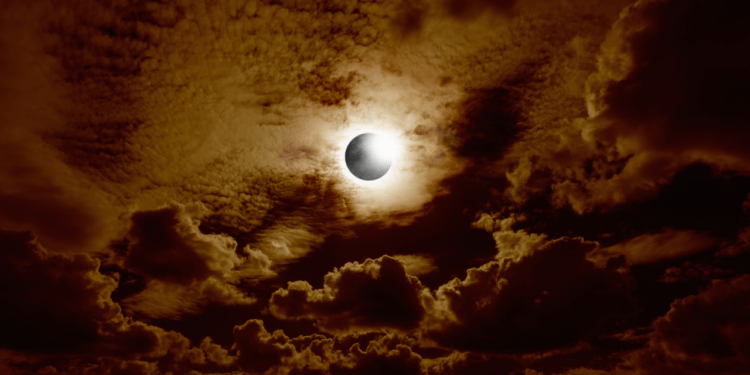No products in the cart.
The Significance of the 2024 Solar Eclipse
This post contains affiliate links.
The year 2024 promises to captivate the world’s attention as a rare celestial event unfolds – a total solar eclipse. This extraordinary occurrence will sweep North America, offering a unique opportunity to witness the moon’s momentary passage between the Earth and the sun, casting a mesmerizing shadow on the planet’s surface.
But this celestial spectacle extends far beyond astronomical wonder, as it has sparked a resurgence of apocalyptic visions and doomsday prophecies.
Unveiling the Cosmic Phenomenon
A total solar eclipse is a captivating natural event when the moon’s shadow completely covers the sun, creating a temporary, eerie twilight. This phenomenon is possible due to the remarkable coincidence of the sun’s and moon’s apparent sizes in the sky, which allows the moon to obscure the sun’s disk precisely. During a total solar eclipse, the sun’s outer atmosphere, known as the corona, becomes visible, offering a breathtaking display of shimmering solar tendrils and loops.
The Apocalyptic Undertones
The 2024 solar eclipse has ignited apocalyptic speculation and doomsday prophecies, with some individuals and fringe groups interpreting the event as a harbinger of the end times. These apocalyptic visions draw upon various religious and cultural traditions, linking the eclipse to biblical prophecies, ancient Mayan predictions, and even modern astrological interpretations.
Navigating the Myths and Legends
Historically, solar eclipses have been viewed with a mix of awe, fear, and superstition. In many cultures, these celestial events were seen as omens of impending doom, often associated with the wrath of the gods or the disruption of the natural order. The 2024 solar eclipse is no exception, as it has revived long-standing myths and legends surrounding the end of the world.
Evaluating the Scientific Perspective
Despite the persistent doomsday narratives, the scientific community offers a rational and informed perspective on the 2024 solar eclipse. Astronomers and astrophysicists emphasize that this celestial event is a natural and predictable occurrence driven by the precise orbital mechanics of the Earth, moon, and sun. They reassure the public that the 2024 solar eclipse poses no threat to the planet or humanity but presents an opportunity to deepen our understanding of the cosmos.
Embracing the Wonder and Awe
As the 2024 solar eclipse approaches, it is crucial to separate fact from fiction and science from superstition. While the apocalyptic visions may capture the imagination, it is essential to recognize the true significance of this celestial event. The 2024 solar eclipse offers a chance to marvel at the elegance and complexity of our universe, deepen our connection with the natural world, and celebrate the ongoing human quest to unravel the mysteries of the cosmos.
The 2024 solar eclipse is a remarkable celestial phenomenon that transcends mere astronomical curiosity. It represents a crossroads where science and human imagination intersect, where the universe’s wonders collide with the enduring human desire to understand our place within it.
By embracing the event with a balanced and informed perspective, we can unlock the true significance of this cosmic spectacle and foster a deeper appreciation for the majesty of the natural world.
Apocalyptic Visions: The 2024 Solar Eclipse and Doomsday Prophecies
Throughout history, humanity has been captivated by the idea of the world’s end, with various cultures and belief systems spawning an array of doomsday prophecies. From ancient Mayan predictions to modern-day conspiracy theories, the human fascination with the apocalypse has persisted, often influencing societal attitudes and behaviors. As we approach the highly anticipated solar eclipse of 2024, this phenomenon has once again come to the forefront, sparking renewed discussions and speculation about the potential implications of this celestial event.
The Allure of Doomsday Prophecies
Doomsday prophecies have long held a powerful grip on the human psyche, tapping into our innate fear of the unknown and our desire to find meaning in the world’s chaos. These predictions, often rooted in religious or spiritual beliefs, offer a sense of certainty and control in the face of the unpredictable nature of life. For some, the belief in an imminent apocalypse provides a framework for understanding current events and a source of comfort in the face of personal or societal challenges.
The 2024 Solar Eclipse: A Harbinger of Doom?
The upcoming solar eclipse on April 8, 2024, has been the subject of intense scrutiny and speculation. This celestial event, where the moon will pass between the Earth and the sun, temporarily blocking the sun’s light, has been seized upon by some as a potential harbinger of doom. Conspiracy theorists and doomsday prophets have linked this eclipse to various end-of-the-world scenarios, ranging from natural disasters to the intervention of supernatural or extraterrestrial forces.
The Psychological Impact of Doomsday Beliefs
The belief in imminent apocalyptic events can have profound psychological and societal implications. For some individuals, these beliefs can lead to a sense of anxiety, hopelessness, and detachment from the present as they become consumed by the perceived impending doom. This, in turn, can contribute to the development of mental health issues, such as depression and panic disorders, as well as the adoption of extreme coping mechanisms.
Societal Responses to Doomsday Prophecies
The impact of doomsday prophecies extends beyond the individual, often manifesting in broader societal responses. Throughout history, the belief in an impending apocalypse has led to the formation of doomsday cults, the stockpiling of supplies, and the abandonment of traditional social and economic structures. In some cases, these beliefs have even sparked violent conflicts as groups clash over their interpretations of prophetic events.
Navigating the Uncertain Future
As the 2024 solar eclipse approaches, it is important to approach doomsday prophecies with a critical and objective lens. While the fascination with the apocalypse is understandable, it is crucial to rely on credible scientific information and maintain a balanced perspective. By fostering a culture of critical thinking and scientific literacy, we can empower individuals to navigate the uncertain future with resilience and purpose.
The enduring appeal of doomsday prophecies and their impact on society are complex and multifaceted phenomena. As we confront the challenges of the modern world, it is essential to approach these beliefs with a nuanced understanding, prioritizing reason, empathy, and a commitment to the betterment of our shared future.
Finally, The 2024 Solar Eclipse And Doomsday Prophecies
The 2024 solar eclipse has captured the public imagination, sparking apocalyptic beliefs. However, it’s crucial to approach such notions rationally, recognizing historical doomsday prophecies’ role in shaping societal responses and perspectives.
While the eclipse is a remarkable astronomical event, apocalyptic visions stem from humans seeking meaning in the natural world. Solar eclipses historically have been seen as divine omens, signaling the end of a new era. Some view the 2024 eclipse as prophetic of natural disasters or societal collapse.
However, these prophecies often rely on cherry-picked data and fail to account for natural and human complexities. They create anxiety and fear, potentially leading to social unrest and personal distress, as seen in past predictions like Y2K and the Mayan calendar.
Approaching the 2024 eclipse with a rational, evidence-based perspective is crucial. While it’s scientifically interesting, separating fact from fiction and relying on authoritative sources is essential. This approach can deepen understanding and contribute to a more informed society, promoting critical thinking and scientific literacy.
Ultimately, the 2024 solar eclipse offers a chance to reflect on human tendencies to find meaning in the cosmos. By grounding beliefs in empirical evidence and understanding complex phenomena, we can gain insights into human experiences and societal resilience in the face of extraordinary celestial events.
This post contains affiliate links.












